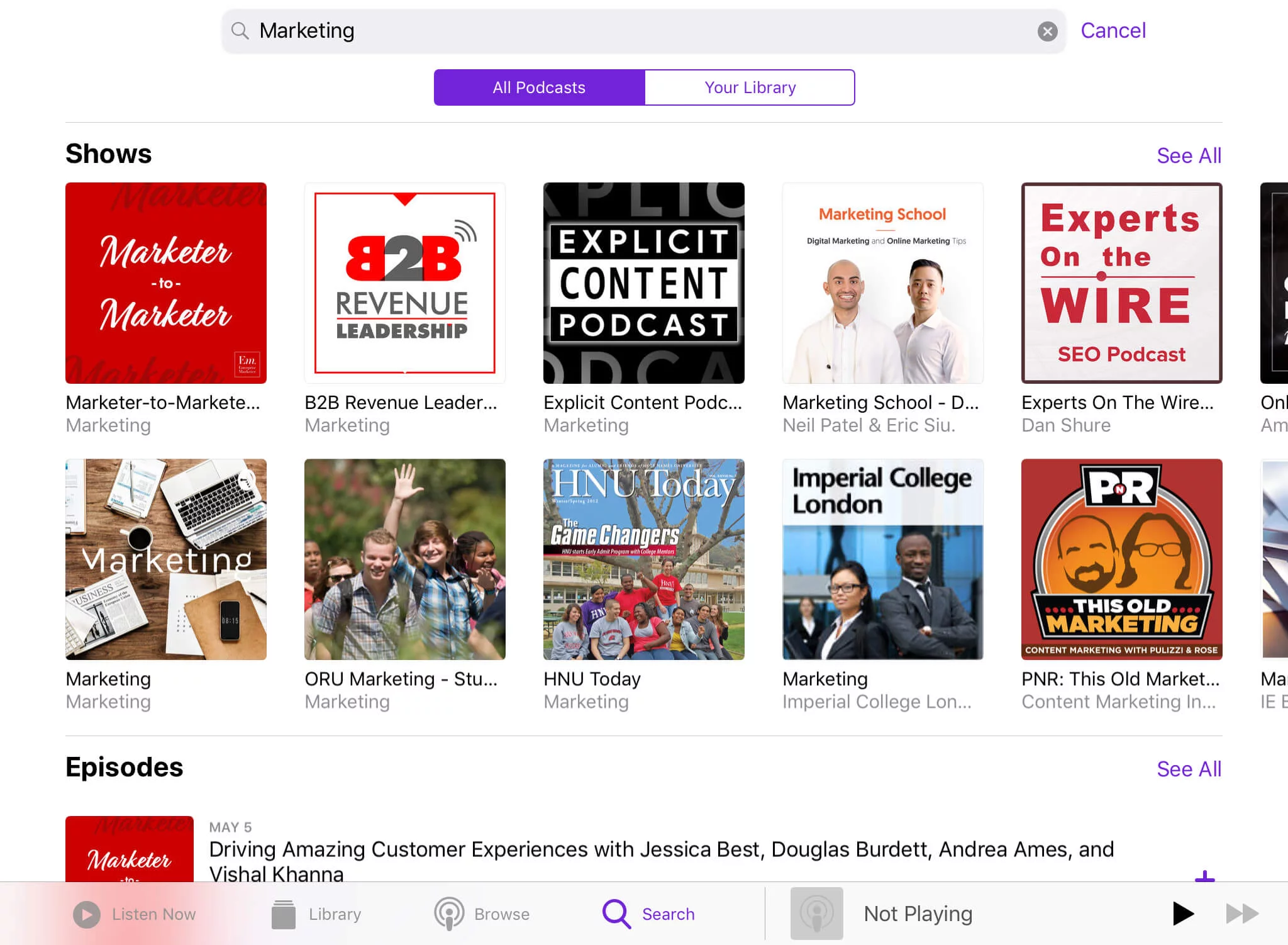
A webinar or podcast? The simple answer is that it really depends on what you want to achieve. Still, we are here to make sure you do not have to figure it out on your own.
Choosing Between Webinars and Podcasts for Your Business
Summarize with
Article contents
What’s the difference between webinar and podcast?
In this article, we will illuminate the topic from different angles and help you decide what works best in your individual case.
A webinar is a live online seminar that brings people together from different parts of the world at the same time. To learn more, read our article called What is a webinar and how it works.
A podcast is a digital audio file that listeners can access through platforms like iTunes or Google Play. They are usually free and available for download at any time.
The main differences between a webinar and a podcast are:
- Webinars are multimedia, meaning they contain both audio and video, while podcasts normally include only audio
- Webinars are mostly held in real-time, while podcasts are usually pre-recorded
- The majority of podcasts are free, as per iTunes and Google Play requirements, while webinars tend to impose a registration fee
It’s worth noting that these differences do not pertain to every single podcast or webinar. It is possible to find podcasts that incorporate video, and there are plenty of free webinars available on the web.
The pros of webinars over podcasts
Here are some of the most important advantages of a webinar:
Webinars make it easier to remember the material
It is perhaps the most critical advantage of webinars over podcasts. Webinars make it possible to present information both audibly and visually via slides, pictures, and video.
Viewers find it easier to remember the material due to the benefits of multisensory learning.
Webinars are better for teaching practical skills
Webinars are also better for teaching practical skills such as programming, web design, marketing analytics, or what have you.
Hosts can share their screen and show instead of telling the viewers what they need to do. This makes the acquisition of practical skills so much faster and easier.
Webinars allow for more personal interaction
Webinars allow you to control your audience in real-time: you get to not only answer their questions but also manage their mood.
For example, you can crack a joke if the atmosphere gets too tense or tell a personal anecdote to make viewers feel more confident in their abilities.
Webinars draw in the most relevant audience
Webinars require you to sign up in advance, sometimes even pay a registration fee and show up at an exact time. Only those most interested would go to that length to watch your webinar.
So you will be able to attract just the right audience that definitely cares about you, your product or service.
The cons of webinars over podcasts
However, not everything is a bed of roses. Take a look at some disadvantages of holding a webinar over a podcast:
Webinars take more effort to prepare
We do not mean to discount the efforts of podcast creators here: they too need to do a profound research and spend hours creating and recording that perfect webinar script for their audiences. However, webinars add a visual component that quadruples the required efforts.
Not only do you need to create an appealing presentation with graphs, diagrams and simply pretty pictures, but you also must rehearse your gestures and the overall performance in front of the camera.
Webinars are not as perfect
It is obvious that an online performance cannot be as polished as a pre-recorded speech. Even if you do not lose your train of thought or get flabbergasted by your audience’s questions, technical issues may arise and cause interruptions, latency and even blackouts.
Webinars have a smaller audience
Not everyone will be able to show up at the exact time you specified. What is more, webinar platforms set a limited number of attendees, so you cannot invite the entire internet to your event. To crown it all, not everybody has sufficient disposable income, were you to decide upon a paid webinar. Podcasts do not pose such problems.
The pros of podcasts over webinars
Here are some notable benefits of podcasts:
Podcasts generate leads constantly
Of course, not all webinars are one-time events. It is possible to create automated webinars that generate leads just as well as any podcast. However, webinars are expected to be interactive, which is one of their main benefits. Many people feel left out when forced to watch a webinar recording instead of participating in a live event.
Podcasts draw in the biggest audience
Most podcasts are available for free on Google Play or iTunes, which are apps that come pre-installed on almost every phone and tablet.

Your listeners do not have to join at a specific time because they can enjoy your podcast whenever and wherever they want, whether they are jogging, commuting, or doing chores at home. This flexibility makes podcasts very convenient, allowing more people to find time to listen. As a result, you can reach a much larger audience than you would if you hosted a live webinar.
Podcasts don’t require immediate marketing
If you don’t market your webinar and people don’t show up, it will a disaster, since now you lose a chance to interact with your audience face-to-face. If you don’t market your podcast and people don’t tune in when it premieres, it’s fine since you can go back to marketing it at any time (unless it’s a time-sensitive podcast, such as a discussion of the latest political events).
The cons of podcasts over webinars
Despite the numerous advantages, podcasts still have their drawbacks:
Podcasts are harder to monetize
Not that it’s impossible, but you definitely shouldn’t do the usual practice of charging a registration fee. This is just not what’s expected of a podcast, and most people would spurn a paid offer like that. So you need to look for alternative monetization options such as affiliate commissions, one-on-one training, e-books, online courses, merchandise, etc.
It’s harder to measure the audience’s satisfaction
Podcasts are offline, so you can’t observe your audience’s reaction in real-time. While polls can be naturally integrated into a webinar as one of the milestones, it is not as easy to do with podcasts. You can only ask the listeners to follow a link to a survey in the description and hope they will be kind enough to do so in their free time.
Podcasts are less hands-on than webinars
Even if you do not intend to teach practical skills such as programming, you may still find it hard to deliver the utmost quality to your listeners. Let’s say you have a purely theoretical history podcast. Don’t you think it would be more beneficial for your audience to see some paintings or photos from that era instead of relying solely on your descriptions?
Conclusion
As you can see, webinar or podcast have both advantages and disadvantages, and there is no clear winner in this battle. Here are some key takeaways from this article:
- Webinar require more time and effort to create since you need to focus on a visual component of your presentation as well as the audio.
- Webinars are better for attracting a smaller and relevant audience, while podcasts are perfect for generating a big host of leads.
- Webinars make it easier to measure the audience’s satisfaction since you can see your viewers and conduct polls in real time. With podcasts, you need to ask listeners to do surveys in their free time.
- Webinars are easier to monetize since you can charge a registration fee, while podcasts require you to be more creative in that regard.
- Webinars hinge more heavily on good immediate marketing, while podcasts allow you to take your time and try different strategies.
Hopefully, these observations will help you choose between a webinar and a podcast.
FAQ
A podcast is an audio show typically available for streaming or downloading from the internet. It can cover various topics, from news and politics to comedy and entertainment.
A webinar is a live, web-based seminar or presentation that allows participants to interact with the presenter and each other. It can be used for various purposes, including training, marketing, and education.
It depends on the purpose and audience. For example, podcasts are better for delivering content that can be consumed “on the fly,” while webinars are better for having live, interactive content for a specific audience.
A webinar is often a live multimedia presentation where participants can interact in real time while a podcast is usually audio only and consumed on demand.
Because a webinar allows you to use both video and audio, share screens and demonstrate tasks, it tends to make it easier for the audience to learn practical skills.
A podcast allows listeners to consume content whenever and wherever they like and reach a broader audience without being bound to a scheduled time or registration.
You will likely need more preparation because you need visual materials, camera performance and live interaction, and also your audience might be smaller because attendance must be scheduled.
You should consider what you want to achieve, who your audience is and how you want to engage them because if you need live interaction and training a webinar is suitable whereas if you prefer flexible access and broad reach a podcast might serve better.
An expert behind the simplified online meeting and webinar software platform, MyOwnConference. In today’s flexible work environment, Dan offers invaluable life hacks, in-depth reviews, and savvy tips for organizing, promoting, and excelling in virtual conferences and webinars.











